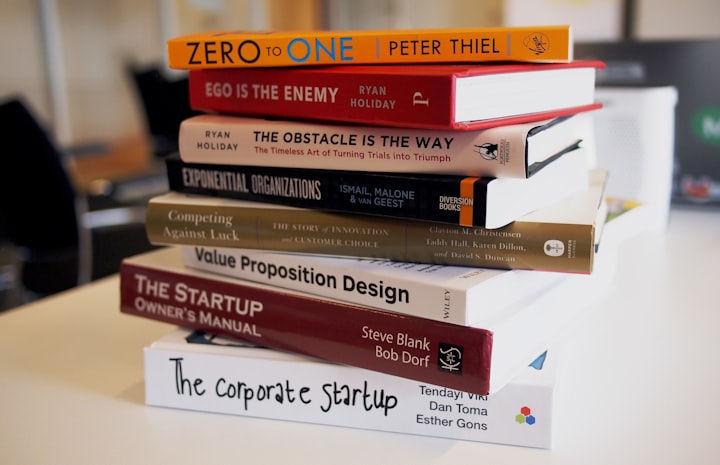5 amazing books about AI that you must read in 2020.
A list with 5 of my favorite AI books that surely will inspire you.

I love to read! I’m always reading… and most of all, I love to read about Artificial Intelligence.
I want to share here some of my favorite AI books that surely will inspire you.
These are great books for anyone who wants to get serious on AI algorithms and how we humans can relate to this topic today and in the future.
I did not will provide you the direct links to the bookstores, because I think that if you really want to buy one of these books, you will find them by yourself doing some research... my goal here is just to give you some inputs about why I consider these books something that you really should have in your library.
The Book of Why: The New Science of Cause and Effect
Written by the Chancellor’s professor of computer science and statistics at UCLA and Turing Award winner Judea Pearl and Dana Mackenzie, a Ph.D. mathematician turned science writer, has written for a variety of popular science magazine over the last 20 years, including New Scientist, Scientific American, and Discover.
This book tells the story of science that has changed the way we distinguish facts from fiction, and yet has remained under the radar of the general public.
“Correlation is not causation.” This mantra, chanted by scientists for more than a century, has led to a virtual prohibition on causal talk. What might sound like a reasonable assertion metastasized in the twentieth century into one of science’s biggest obstacles, as a legion of researchers became unwilling to claim that one thing could cause another? This all changed with Judea Pearl, whose work on causality was not just a victory for common sense, but a revolution in studying the world.
The causal revolution, instigated in this book by Judea Pearl and his colleagues, has cut through a century of confusion and established causality — the study of cause and effect — on a firm scientific basis.
Pearl’s work enables us to know not just whether one thing causes another: it lets us explore the world and the worlds that could have been.
It shows us the essence of human thought and the key to artificial intelligence, and if you want to understand it more in-depth, you need to read The Book of Why.
How to Create a Mind: The Secret of Human Thought Revealed
Ray Kurzweil, an inventor, and futurist who has published books on health, artificial intelligence, transhumanism, and the technological singularity, is arguably today’s most influential and often controversial futurist.
In How to Create a Mind, Kurzweil presents a provocative exploration of the most critical project in human-machine civilization — reverse-engineering the brain to understand precisely how it works and using that knowledge to create even more intelligent machines.
Kurzweil discusses how the brain functions, how the mind emerges from the brain, and the implications of vastly increasing the powers of our intelligence in addressing the world’s problems. He thoughtfully examines emotional and moral intelligence and the origins of consciousness. The author envisions the radical possibilities of our merging with the intelligent technology we are creating.
Sure to be one of the most widely discussed and debated science books of the year, How to Create a Mind is sure to take its place alongside Kurzweil’s previous classics, which include Fantastic Voyage: Live Long Enough to Live Forever and The Age of Spiritual Machines.
Life 3.0: Being Human in the Age of Artificial Intelligence
How will Artificial Intelligence affect crime, war, justice, jobs, society, and our very sense of being human? The rise of AI has the potential to transform our future more than any other technology — and there’s nobody better qualified or situated to explore that future than Max Tegmark, a Swedish-American physicist and cosmologist. He is a professor at the Massachusetts Institute of Technology and the scientific director of the Foundational Questions Institute.
This book empowers you to join what may be the most important conversation of our time. It doesn’t shy away from the full range of viewpoints or the most controversial issues — from superintelligence to meaning, consciousness, and the ultimate physical limits on life in the cosmos.
The Emotion Machine: Commonsense Thinking, Artificial Intelligence, and the Future of the Human Mind
Our minds are working all the time, but we rarely stop to think about how they work.
The author, Marvin Lee Minsky (born August 9, 1927, died January 24, 2016), was an American cognitive scientist in artificial intelligence (AI), co-founder of Massachusetts Institute of Technology’s AI laboratory, and author of several texts on AI and philosophy.
The human mind has many different ways to think, said Marvin Minsky, the leading figure in artificial intelligence and computer science. We use these different ways of thinking in other circumstances, and some of them don’t even associate with thinking.
“The Emotion Machine” explains how our minds work, how they progress from simple kinds of thought to more complex forms that enable us to reflect on ourselves — what most people refer to as consciousness, or self-awareness.
Once we know thinking, we can build machines — artificial intelligence — that can assist with our thinking, machines that can follow the same thinking patterns that we follow, and think as we do. These humanlike thinking machines would also be emotion machines — just as we are.
This is a brilliant book that challenges many ideas about thinking and the mind. It is as insightful and provocative as it is original, the fruit of a lifetime spent thinking about thinking.
Artificial Intelligence: A Modern Approach
The long-anticipated revision of this best-selling book by Stuart Russell, Professor of Computer Science and Smith-Zadeh Professor in Engineering, University of California, Berkeley and Honorary Fellow, Wadham College, Oxford and Peter Norvig, Director of Research at Google, offers the most comprehensive, up-to-date introduction to the theory and practice of artificial intelligence.
The book is as close to exhaustive as is currently available in the field, including in-depth treatments of non-technical learning material while providing an accessible and understandable overview of significant concepts.
Since the 2003 edition, increased coverage has been given to topics such as constraint satisfaction, local search planning methods, multi-agent systems, game theory, statistical natural language processing, and uncertain reasoning over time.
Attention has also been given to providing more detailed descriptions of algorithms for probabilistic inference, fast propositional inference, probabilistic learning approaches including EM, and other topics.
The comprehensive, up-to-date coverage includes a unified view of the field organized around the rational decision-making paradigm.
The authors’ approach delivers in-depth coverage of basic and advanced topics. It provides a basic understanding of the frontiers of AI without compromising complexity or depth.
It conveys an in-depth understanding and a clear explanation of such concepts as supervised and unsupervised machine learning. Thus, to the layman, a sense of why there will be no jobs for machine learning supervisors!
It is highly recommended. Intellectually, Artificial Intelligence: A Modern Approach provides both a conceptual artificial intelligence gym and a running track to limber upon. The more you use it, the more you will get from it.
Conclusion
These five masterpieces are not just good AI books, but I would consider them some of the most exciting and thoughtfully structured textbooks I’ve seen on this subject.
They present useful information about particular aspects of AI while providing fascinating historical background.
I always think that people, especially in the scientific and engineering society, underestimate the importance of simple explanations of difficult concepts, especially concerning people that are new in the field; these books help on making difficult concepts seem not so difficult!
One more thing...
Also, I’ve just published my new ebook on Amazon, and I’m already working to publish some other books across this year and I’m sure that some of them may be interesting for you… have a look:
- AI, Robotics and Coding (for Parents): A practical guide for analog parents with digital kids
- Learn AI online: More than 200 resources online to start learning AI
- The Terminator paradox: How neuroscience can help us to understand Empathy and the fear of Artificial Intelligence
- Artificial Intelligence from A to Z: Demystifying the essential concepts of AI
- A.I. in 2020: A Year writing about Artificial Intelligence
Other articles about AI
If you want to go further on your learning journey, I’ve prepared for you an amazing list with more than 60 training courses about AI, Machine Learning, Deep Learning, and Data Science that you can do right now for free:
- What is Predictive Analytics, and how can you use it today?
- The best free courses to learn AI, ML, and Data Science today.
- More than 60 courses with ratings and a summary (Made by AI, of course).
- Can we explain AI? An Introduction to Explainable Artificial Intelligence.
Disclaimer: I do not receive any money from the authors or editors or have any direct relationship with anyone. Mine are simple indications based on my positive learning experience through their excellent books.
About the Creator
Jair Ribeiro
A passionate and enthusiastic Artificial Intelligence Evangelist who writes about people's experiences with technology and innovation.






Comments
There are no comments for this story
Be the first to respond and start the conversation.